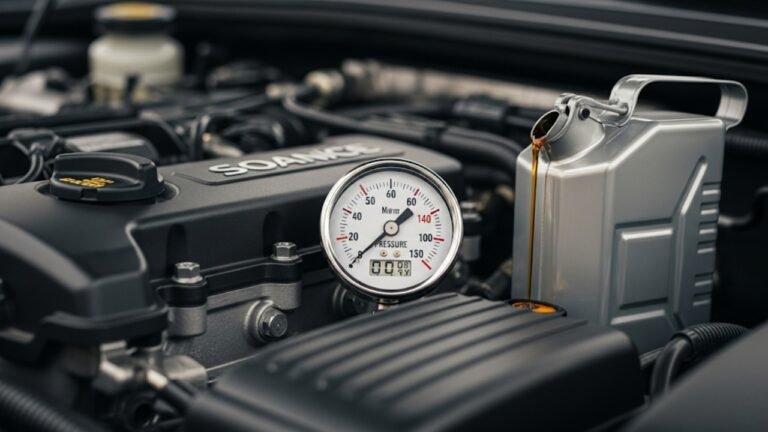Can I Use Synthetic Oil in My Car?


I used to be one of those drivers who never thought much about oil. If the engine sounded fine, I figured everything was working. But one day, I walked into my mechanic’s shop, and he casually asked, “Hey, have you ever tried synthetic oil?” I blinked. “Can I use synthetic oil in my car?” I asked, half-expecting a lecture.
Instead, he smiled and said, “Most people can—and probably should.”
That one question sent me on a journey of learning, testing, and understanding what synthetic oil is and whether it really matters for everyday folks like you and me. Whether you’re driving a brand-new SUV or a ten-year-old sedan, this guide will answer the big question: Can I use synthetic oil in my car?
Let’s break it down with stories, facts, and some honest advice from my own experience.
In This Article
- 1 What Exactly Is Synthetic Oil, Anyway?
- 2 Can I Use Synthetic Oil in My Car? (Short Answer: Yes—But Let’s Go Deeper)
- 3 Is It Safe for High Mileage or Older Engines?
- 4 Synthetic vs Conventional Oil: What’s the Real Difference?
- 5 How Often Should I Change Synthetic Oil?
- 6 Why Synthetic Oil Might Be the Best Option for You
- 7 Can I Mix Synthetic Oil with Conventional Oil?
- 8 Synthetic Blend vs Full Synthetic: Which One Should You Use?
- 9 FAQs About Synthetic Oil You Need to Know
- 9.1 1. Can I use synthetic oil in my car if I’ve always used conventional?
- 9.2 2. Does synthetic oil increase fuel economy?
- 9.3 3. Is synthetic oil bad for older engines?
- 9.4 4. How can I know if my car needs synthetic oil?
- 9.5 5. Can I switch back to conventional oil after using synthetic?
- 9.6 6. Why is synthetic oil more expensive?
- 9.7 7. Is synthetic oil better for hot climates?
- 9.8 8. How do I know which synthetic oil to use?
- 10 Real Talk: My Personal Journey With Synthetic Oil
- 11 Pros and Cons of Using Synthetic Oil
- 12 When You Should Avoid Synthetic Oil
- 13 How to Make the Switch to Synthetic Oil (Smoothly)
- 14 The Emotional Side: Why It Feels Good to Switch
- 15 Conclusion: So, Can I Use Synthetic Oil in My Car?
What Exactly Is Synthetic Oil, Anyway?

Synthetic oil is a lubricant made from chemical compounds. Unlike conventional oil, which comes straight from refined crude oil, synthetic is designed and engineered in labs to have better properties. Think of it like comparing filtered water to spring water. Both hydrate you, but one is cleaner and more consistent.
Key features of synthetic oil:
-
Resists breakdown at high temperatures
-
Flows better in cold starts
-
Keeps your engine cleaner
-
Reduces engine wear over time
I remember the first time I switched. It was winter, and my car usually struggled to start. After using synthetic, it turned on smoother than ever. That’s when I realized: not all oils are created equal.
Can I Use Synthetic Oil in My Car? (Short Answer: Yes—But Let’s Go Deeper)
Now to the golden question: Can I use synthetic oil in my car?
Yes, in most cases, you can. Whether your car is new, old, hybrid, or even a performance model, synthetic oil is likely a good choice. Most modern engines are actually built to run on synthetic or synthetic blends.
Here’s a table that makes it clearer:
| Car Type | Synthetic Oil Recommended? | Notes |
|---|---|---|
| Modern vehicles | Yes | Designed for it |
| Older cars (pre-2000) | Sometimes | Use synthetic blend if seals are old |
| Turbocharged engines | Yes | Synthetic resists high heat |
| Hybrids | Yes | Keeps engine clean with less use |
| High mileage engines | Yes | Helps reduce wear if seals are in good shape |
When I switched my 2008 sedan to synthetic, I was nervous. I had read stories of oil leaks, pressure issues, and all sorts of rumors. But after speaking to three mechanics and doing a lot of reading, I found that those fears were often based on older synthetic formulations that aren’t an issue anymore.
So yes, you can use synthetic oil in your car, and in many cases, you probably should.
Is It Safe for High Mileage or Older Engines?
One common myth I hear is, “Don’t use synthetic oil in old engines—it’ll cause leaks.”
That was true… decades ago. Modern synthetic oils are blended with seal conditioners that help prevent leakage. If your engine seals are already worn out or cracked, any oil—synthetic or not—can leak.
But for most high-mileage engines in decent shape, synthetic oil actually protects better. It reduces engine wear and cleans sludge that conventional oils often leave behind.
From My Experience:
My dad drives a 2004 Corolla with over 220,000 km. Last year, I convinced him to try synthetic oil. His fuel economy improved slightly, and his engine ran quieter. No leaks, no issues.
So yes—even older cars can benefit from synthetic oil. Just check your gaskets and seals first.
Synthetic vs Conventional Oil: What’s the Real Difference?
It’s like comparing handmade coffee to instant. Both will do the job, but one gives you a smoother, cleaner experience. Here’s a comparison chart to make it clearer:
| Factor | Synthetic Oil | Conventional Oil |
|---|---|---|
| Engine protection | High | Medium |
| Cold temperature flow | Excellent | Poor |
| High temperature life | Long-lasting | Breaks down fast |
| Cost | Higher upfront | Cheaper initially |
| Long-term savings | Yes (fewer changes) | No (more changes) |
So when you ask, “can I use synthetic oil in my car”, it’s like asking if you can treat your engine better. The answer is yes—but like anything premium, it comes at a slightly higher cost.
How Often Should I Change Synthetic Oil?
This was a game-changer for me. When I used conventional oil, I had to change it every 3,000 to 5,000 miles (or 5,000 to 8,000 km). With synthetic oil, I only need to change it every 7,500 to 10,000 miles (or 12,000 to 16,000 km).
That’s nearly half as often.
So even though synthetic oil costs more per bottle, you save on fewer oil changes. Plus, it’s less hassle overall.
Pro tip: Always follow your car manufacturer’s recommendation. Some cars are designed to run even longer on synthetic oil—up to 15,000 miles per change.
Why Synthetic Oil Might Be the Best Option for You
Let’s simplify this. Here are reasons why synthetic oil may be a better fit for your car:
-
You drive in extreme heat or cold
-
You do lots of stop-and-go city driving
-
Your car has a turbocharger or high-performance engine
-
You tend to forget oil changes
-
You want a cleaner engine long-term
I live in a place where summers are brutal—sometimes over 40°C. Synthetic oil doesn’t break down as fast, and my engine doesn’t overheat like it used to with regular oil.
It’s not just about oil. It’s about peace of mind.
Can I Mix Synthetic Oil with Conventional Oil?
Short answer: Yes, but it’s not ideal.
Mixing synthetic and conventional oil won’t damage your engine, but it reduces the benefits of full synthetic. You get a blend—not the full protection of synthetic oil.
Sometimes, in emergencies, I’ve topped off my engine with conventional oil when I didn’t have synthetic nearby. That’s fine temporarily. But for regular oil changes, stick with one type.
Synthetic Blend vs Full Synthetic: Which One Should You Use?
When I first made the switch, I was confused between full synthetic and synthetic blend. It felt like choosing between premium coffee and a latte from a vending machine—both caffeinate you, but one is smoother and more refined.
So what’s the difference?
-
Full synthetic oil is completely engineered for performance. It has uniform molecules, fewer impurities, and offers maximum protection. It’s the best option if you want longevity and peak engine health.
-
Synthetic blend is a mix of synthetic and conventional oil. It’s cheaper than full synthetic and still gives you better performance than conventional. But not quite as good as full synthetic.
Which one is right for you?
-
Choose full synthetic if you have a new car, drive in harsh conditions, or want top performance.
-
Choose a synthetic blend if your car is older, or you’re looking for a budget-friendly upgrade from conventional oil.
I started with synthetic blend when I was on a tighter budget. Eventually, I switched to full synthetic—and honestly, my engine has never run smoother.
FAQs About Synthetic Oil You Need to Know
1. Can I use synthetic oil in my car if I’ve always used conventional?
Absolutely! As long as your car’s seals and engine are in good shape, switching to synthetic oil won’t hurt anything. In fact, it may clean out old deposits and improve engine performance.
2. Does synthetic oil increase fuel economy?
Yes—though not drastically. Synthetic oil reduces friction inside the engine, which can help improve mileage slightly. It’s a small boost, but every little bit counts.
3. Is synthetic oil bad for older engines?
Not anymore. Older engines used to have issues due to mismatched seal compatibility. Modern synthetics are safe, even for cars from the early 2000s—just check your owner’s manual first.
4. How can I know if my car needs synthetic oil?
Check your owner’s manual. Many modern cars require synthetic oil, especially turbocharged or high-performance engines. If it’s not required, it’s still usually recommended.
5. Can I switch back to conventional oil after using synthetic?
Technically yes, but it’s not recommended unless necessary. Switching back won’t hurt your car, but you’ll lose the benefits of synthetic oil like better temperature resistance and engine cleanliness.
6. Why is synthetic oil more expensive?
Because it’s engineered to be purer, more stable, and longer-lasting. But since you don’t need to change it as often, the long-term cost often balances out.
7. Is synthetic oil better for hot climates?
Definitely! Synthetic oil holds up better under heat. If you live where summer is relentless, this type of oil won’t thin out or break down as quickly as conventional.
8. How do I know which synthetic oil to use?
Look for viscosity ratings (like 5W-30 or 0W-20) in your car’s manual. Stick with the recommended viscosity, even if you change oil types.
Real Talk: My Personal Journey With Synthetic Oil
I’ve driven everything from rust-bucket hatchbacks to a mid-range hybrid SUV. For years, I never cared what oil went into my engine—just picked the cheapest option.
That changed after a road trip where my car overheated halfway through the hills. The mechanic I found in that small town asked me, “You’re still using mineral oil in this heat?”
I was embarrassed. But I learned something important.
He poured in synthetic oil, gave me a bottle to keep, and said, “Next time, invest in your engine. It’ll thank you.”
He was right.
Since that moment, I’ve used synthetic oil in every vehicle I’ve owned. Starts are smoother. Mileage improved. My engines sound healthier. I even sleep better knowing I’ve done something kind for my car.
Pros and Cons of Using Synthetic Oil
Let’s break it down honestly:
Pros:
-
Better protection in extreme temperatures
-
Longer time between oil changes
-
Cleans engine sludge and deposits
-
Improves fuel efficiency slightly
-
Reduces engine wear and tear
Cons:
-
Higher upfront cost
-
Overkill for very old or seldom-used cars
-
Some older engines may need seal inspection
For me, the benefits outweigh the cost. It’s not just oil—it’s long-term engine health.
When You Should Avoid Synthetic Oil
Yes, there are some situations where synthetic oil isn’t necessary—or at least not urgent.
-
Vintage cars (pre-1980s) – These engines were not designed with modern synthetics in mind. Stick with conventional unless advised otherwise.
-
Engines with known gasket issues – If your car is leaking oil already, fix the problem first before switching.
-
Tight budgets – If you can’t afford synthetic now, go for a synthetic blend as a step up.
Remember, any clean oil is better than dirty oil—no matter the type.
How to Make the Switch to Synthetic Oil (Smoothly)
You don’t need to do anything fancy.
Just tell your mechanic (or oil change center), “I’d like to switch to synthetic.” They’ll drain the old oil, replace the filter, and fill up with synthetic. That’s it.
If you’re doing it yourself:
-
Drain old oil completely
-
Replace oil filter
-
Pour in the right amount of synthetic oil (check your owner’s manual)
-
Run the engine for a few minutes, then check for leaks
No engine flush is required unless your engine is full of sludge (which a mechanic can diagnose).
The Emotional Side: Why It Feels Good to Switch
This might sound strange, but I feel emotionally better knowing I treat my engine well. Think of your car as a loyal friend—it takes you to work, to holidays, and to emergency late-night drives for ice cream.
Giving it quality oil is one of the most basic ways you can say, “Thanks, buddy.”
It’s about care. About respect. About being a responsible adult in a world of chaos.
And that’s kind of beautiful, don’t you think?
Conclusion: So, Can I Use Synthetic Oil in My Car?
Let’s circle back to that first question.
Can I use synthetic oil in my car? Yes. You absolutely can—and in most cases, you probably should.
It doesn’t matter if you drive a decade-old Corolla, a brand-new electric hybrid, or something in between. Synthetic oil offers peace of mind, longer intervals between oil changes, and better engine performance.
Is it more expensive? A little. But the long-term savings and engine health are worth every penny.
And once you switch, you may never want to go back.






